- Home
- Richard Lee Byers
The Plague Knight and Other Stories Page 2
The Plague Knight and Other Stories Read online
Page 2
As far as I could tell, I didn't discover any secrets that would help us drive him back into his grave, but at least the attempt kept me occupied till it was time to arm.
We marched out an hour before sunset. Our road took us above the town, by pasture and newly plowed fields, then into a forest of oaks and elms, old trees encrusted with moss and bearded with mistletoe. Ravens cawed and flapped away from us; unseen creatures fled through the underbrush.
We reached the tiltyard at dusk.
It was one of the largest and most ornate ones I'd ever seen. The tiered seats of the berfrois could have accommodated five hundred dignitaries. There were cottages and sheds, constructed with mock battlements and decorated with scenes of adventure from various romances, where tourneyers could arm and smiths could labor. Sadly, now the woods were reclaiming it all. The field was overgrown, the paint peeling, and the structures already crumbling into ruin.
"He isn't here," said Louis de Harsigny. The fool sounded disappointed.
"He will be," Ulrich said. "Take your places."
We spread out in a sort of crescent at the edge of the field, with spearmen and our handful of archers on the right, knifemen and the Count's troop of crossbowmen on the left, and us horsemen in the middle, whence we could charge a goodly portion of the yard without the various tilts and fences getting in our way. Then there was naught to do but wait, while the sky blackened, the first bats swooped overhead, and fear gradually gnawed my nerves to shreds.
"He isn't coming," a knight said at last, and of course that was the moment when he did.
I felt him before I saw him, a sensation of cold and dread that enveloped us like fog. The horses felt it as we did, whickered and shied. Then he materialized at the other end of the field, forming out of nothing, just the way his gauntlet had appeared.
From the crest of his helm to the toes of his metal shoes, he was all as white as his gaynpayn, with a blank shield on his arm and an ivory lance in his fist. White, too, was his steed, with empty, pupilless eyes like the orbs of a statue. That first moment, standing silent and motionless in the failing light, they resembled a gleaming chessman carved from bone.
"I expected you last night," the apparition called His voice was a gravelly baritone, no different than a live man's. "I should have known you wouldn't scrape up the courage to face me until I proved I could destroy you. Who fights first?"
No one, I hoped. The glory of single combat was all very well in the lists, but this was war against a horror out of Hell. Surely we were all going to fall on him at once, with no more regard for chivalry than a swarm of bees stinging a bear.
But to my amazement, Gunter spurred forward on his big chestnut stallion, tufts of red beard jutting from beneath his basinet. If he wasn't simply drunk, he was a far bolder man, or at least far more avid for gold and a rich nobleman's favor, than I was. And Ulrich, who as a former rutter should have had no patience with this idiocy, waved him on.
Gunter couched his lance and galloped forward. If he was drunk, I couldn't tell it; he was secure in his seat and his aim was true. Enguerrand charged to meet him. There was something subtly wrong about the white mount's gait, as though its legs weren't jointed quite the same as mortal horses' were.
In the first course, Gunter's stallion swerved from the line of charge, and neither knight could attack the other. They wheeled their destriers around, Gunter barking commands at his and Enguerrand swaying in the saddle, and rode at each other again.
This time Gunter's point hit the middle of the white shield, but it glanced harmlessly away. An instant later, the ghost knight's lance punched into his gorget. The Saxon flew from his horse in a shower of blood.
Enguerrand wobbled again, regained his balance and cantered back to the far end of the field. "Who's next?" he cried.
A knight even younger than I was, a lad I didn't know, shouted, "Me," just a second ahead of Louis and several others. Ulrich gave him leave and he rode forward, the argent bezants on his shield and the cloth-of-silver favor knotted around his forearm glimmering in the gloom.
Like Gunter, the youth fought well. His lance caught Enguerrand square in his cuirass, but instead of wounding or unhorsing him, it shattered. The specter didn't seem to aim soon enough, but at the last possible moment his gory spear whipped into line, struck the boy's shield and hurled him out of the saddle.
Unhurt, the young man scrambled to his feet, unsheathed his falchion. Enguerrand exchanged his lance for the war hammer hanging at his saddle and came at him again.
The youth struck at the white steed's neck, a shrewd stroke that should have brought it down. But his blade rebounded as though the beast were truly made of marble. The boy stumbled, his shield bobbed too low, and Enguerrand smashed his hammer down on his head. The hideous crunch resounded across the glade.
"And next?" the ghost knight asked.
Ulrich chewed at his lower lip, clearly deliberating, then scowled and drew himself up straight. "To Hades with this. Bows, crossbows, shoot on my signal!" he shouted. "Then, riders forward!"
"I tell you, it won't work," Enguerrand said. "This time someone has to do it honorably."
I leaned forward, crooned encouragement to Ebony, my war-horse. He tossed his head impatiently, as though telling me he was already prepared to do his work, thank you, and I'd best make sure I didn't bungle mine. Hans reached inside his robe, took hold of something, and started mumbling. The archers and crossbowmen aimed, and the rest of us readied hand weapons. Ulrich raised his sword, then snapped it down.
The tiltyard thrummed with the flight of arrows and quarrels, the chill in the air grew suddenly colder, and we started to die.
Agony flowered in my joints, tore at my bowels. My head spun, and I nearly slid off Ebony. That probably would have been the end of me, for horses all around me were going wild, trampling those who dropped beneath their hooves.
A reek of putrefaction rose over the field. A squire doubled over, retching, blood and pus pouring through the vents in his visor. A man-at-arms stabbed at his own breast with his dagger, trying to breach his brigandine so he could scratch the sores beneath. Unharmed by our missiles, Enguerrand laughed.
The plague, I thought through a haze of pain and terror. We're all catching the plague at once.
I struggled to turn, to fight my way through the press of terrified men and maddened horses back into the forest, so weak and dizzy I could barely cling to my saddle. But fortunately, Ebony hadn't lost his mettle like his fellows, and once he understood where I wanted to go, he carried me there.
Eventually a number of us reassembled on the road.
Half our force was gone, many perished in the tourney-field, some others, I suspect, running away. We who remained felt haler than we had a few minutes before, but still frightened, weak, and nauseous, in no condition to fight any more that night. Grimly suspecting that we might truly be infected, that every last one of us might be dead before dawn, we crept back down the road to Ulrich's castle. I fancied I heard Enguerrand's laughter all the way out of the woods.
Sick as we were, it was torture just to tend the horses. Once we finally had them put up in their stalls, Geoff and I collapsed in the straw, too weary to cross the courtyard and climb the stairs to our beds.
I slept as though drugged, awoke late the following afternoon to find that I felt healthy again. Geoff was snoring, his skin unblemished and no blood or yellow matter leaking from his mouth. Careful not to wake him, I pulled on my boots, buckled on my sword and dagger, and wandered out into the sunlight.
The corpse of another plague victim lay just beyond the door, stinking and crawling with ants. Apparently no one was willing to convey them outside anymore. Across the yard, Raymond and several others sat somberly honing their weapons.
I hailed them, then made my way into the donjon. Traversing its empty, echoing corridors and chambers, gingerly stepping over the bodies that occasionally blocked my path, I realized that the castle was nearly uninhabited; almost everyone had d
ied, lay dying at that very moment, or had run away.
But fortunately, there was still food in the kitchen. I broke my fast on brown bread and honey, grapes, and beef and cheese pie left over from Ulrich's feast, then climbed the winding stairs to Hans Buchart's chamber.
As I'd expected, a guard stood on the landing before the magician's door, a haggard-looking spearman with a long black mustache that drooped like the rest of him. Either Ulrich was afraid his magician would desert, or worried that he'd say something that would make the rest of us desert. Or possibly both.
I smiled. "I'm here to relieve you. Go down and find something to eat."
He frowned. "You aren't the Count's man."
"I am now, swore my oath not an hour ago. It seems a few positions opened up."
The spearman grimaced. "Isn't that the truth. All right, then, God knows it's about time. I've been up here since morning."
I waited for him to clump down the stairs, then tested the latch. The door clicked open.
Beyond was a large room with several casements, all swung open to admit the breeze. A brindle cat, pet or familiar, slumbered on one sun-washed windowsill. A chalked pentagram, and the smudged remnants of others, filled an unfurnished section of floor, and astrological diagrams hung on the walls.
In the middle of the chamber stood a long table. Mortars, pestles, alembics, and vials of liquids and powders occupied one end, and Hans sat reading at the other, an enormous quantity of books, thirty at least, piled before him. When I stepped across the threshold, he looked up. His eyes were ringed with black, his face, livid.
"Your master uses you unkindly," I said.
The magician sighed. "He has reason. I assured him Enguerrand wouldn't return. I was so desperate for his patronage, I would have guaranteed anything. And when the ghost started to walk in his dreams, I said the same. Then, when he began glimpsing him at the forest tiltyard, I swore to banish him, and when he saw him here in the castle, I promised again. And look at us now, about to die a vile death and take a good piece of the Germanies with us. No wonder he suspects that I betrayed him, for some cryptic elvish reason of my own. But the truth is, my magic isn't strong enough. I truly thought it was, but it simply isn't."
"Forgive me, but you don't seem especially distraught about it."
"Oh, I am, but I'm trying to be a Stoic." His golden eyes glowed brighter. "You don't belong here, young sir knight."
"No," I admitted, seating myself in the only other chair. "But I want to understand this foe we're facing. I always try to puzzle things out. It's my nature."
Hans' lips quirked in a momentary smile. "Mine too. What would you like to know?"
There were a great many questions I could have asked, but I didn't want to alarm him by probing things he'd rather keep hidden, or call on him to speak against his lord. Besides, I didn't know how much time we'd have, so I'd best concentrate on the things that seemed genuinely important. "Tell me if I really grasp what's happening. To end the pest, someone must kill Enguerrand, and only one man at a time can attack him. If more try, they immediately start to catch the disease themselves, and fall over dead if they don't run away fast enough."
"Just so. It's a warding, to keep the odds the way he wants them."
"But he has other protection too. He must, because he doesn't fight that well. Gunter and the lad were better; if not for magic, one of them would have beaten him."
Hans snorted. "You aren't easily awed, young sir. Instead of quailing at a phantom out of Hell, you rate its jousting technique." I shrugged. "You're quite right; a second warding underlies the first, the same spell that guarded Enguerrand in the latter years of his life. People who watched him tourney often criticized his form, but somehow he always threw down his opponents."
"Are you telling me, then, that he can't be killed?"
"Anything that walks the earth can die, including things that have lived and died before. Averroes proved it."
The brindle cat roused itself, jumped off the sill, and trotted over to rub against my ankles. I bent and scratched behind its ear. "Good. I thought so. If the charm that bested Gunter and the boy made him absolutely invincible, he wouldn't have bothered to concoct the one that keeps us from coming at him en masse. So how do we kill him?"
The old man shook his head, ran his long, ink-stained fingers through his fine white hair. "I wish I knew."
The cat purred. I said, "I'm . . . sorry to hear that."
"Malagigi demonstrated that every great sorcery, every curse, transformation, work of creation, spell of protection, or other effect designed to last longer than a day, has to contain a flaw; in a sense, that's the knot that binds it together. So there's always a way to dissolve or circumvent it. Unfortunately, that's not much help if you don't know what it is."
Old stories danced in my head. "The magic will fail when he fights the son of a king. Or a woman. Or a knight who's seen the Grail, or one wearing a ruby ring, or a cross-eyed swineherd with piles! Christ, it could be any ridiculous condition, couldn't it?"
"Very nearly, I'm afraid."
I straightened up. The cat, not yet sated, resumed bumping its head against my boots. "If we knew who cast the spell--"
Hans smiled bitterly. "Oh, I do. Unfortunately, it was Enguerrand himself. He was as foul a scholar of Darkness as any that served Tiberius; your Church knew what it was doing when it proscribed the Art to the children of Adam. I've been studying his grimoires, but the secret simply isn't there, and divination won't reveal it either."
A fist rapped on the door. "Doctor!" a male voice called.
The warlock turned. "Yes?"
"Sorry to disturb you, magister, but the Count wants you and all the warriors in the Stag Hall right away."
"Coming," answered Hans, then looked back at me. "Shall we?" The cat yowled, protesting our departure.
The Stag Hall was an informal audience chamber, its walls decorated with racks of antlers, and tapestries depicting hunting scenes. Some of my comrades sat slumped on benches, staring into the shadows, some whispered back and forth, and still others paced, restless as tigers in a cage.
I thanked Hans for his counsel, then crossed the room to stand by Geoff. Ulrich mounted the pedestal supporting his seat of judgment a moment later.
"Well, now you've seen the specter for yourselves," he said when the hall grew quiet. "Will you still stand with me?"
"Unto death!" cried Louis de Harsigny.
"We're still here," said Raymond dryly. "Do you have a plan?"
"Only a simple one. As we discovered, it's certain death to attack Enguerrand en masse. But, fell and puissant as he is, a single warrior may be able to destroy him. So we'll draw lots, first the knights, then the squires, then the men-at-arms. Go forth one at a time--"
"I don't need to draw," Louis said. "Send me first."
"No!" I shouted. "Don't send anyone!" Geoff gaped at me.
Ulrich scowled. "Who are you?"
"Martin Rivers, knight bachelor, my lord."
"And you don't think anyone should fight." Men muttered, growled.
"Not now; we wouldn't have a chance. We have to cancel Enguerrand's spell of protection. Doctor Buchart explained it to me--"
"Did he indeed. Well, he told me the same thing, Enguerrand's armored in charms. I told him to break them." He turned and glowered at the old man. "Did you?"
Hans said, "No, my lord. I couldn't."
"Then we'll just have to rely on our good right arms--"
"And our faith," Louis interjected.
The Count grimaced. "--yes, and our faith, to succeed where your black Art failed."
"If prowess alone could prevail," I said, "then Gunter or the other knight would have won. We have to think--"
"I say we have to do battle, now, before we all catch the pest. Will you ride with us, or not?"
"Not," I replied. "Forgive me, my lord, but it's stupid."
"Coward!" they shouted. "Caitiff! Traitor!" Someone grabbed me from behind. A squire with a bro
ken nose and a gold ring in his ear whipped out his dagger. I suddenly doubted I'd leave the Stag Hall alive.
But Ulrich bellowed, "Stop!" For that moment, he seemed once again the courteous lord who'd welcomed us to the tourney, not the harried, conniving brute of the past two days. "He hasn't sworn any oaths to me, and if he chooses to abandon us, no one here has any right to punish or forbid him. Go, poltroon. Take yourself out of my lands."
The hands gripping me let go. Geoff and I hastened out of the keep, saddled our palfreys, and cantered out the gate before the Count could change his mind.
"Thank God the half-elf brought you to your senses," Geoff said once we were safely down the road. "If we ride north all night--"
"And leave the plague to rage unchecked? What if it crosses the Channel into England?"
"What's this lunacy? You told Ulrich there was nothing anyone could do!"
Finding myself too warm, I tossed the folds of my cloak back over my shoulders. "No, I told him that what he intends to do won't work. Which he already knew, but he's desperate."
"But you don't know what to do either."
"Unfortunately, that's true. But, damn it--" At that moment, a notion struck me. “Wait. I have an idea.”
"What?"
If I'd answered, he would have told me how daft it was, and I didn't want to hear. "You'll see. Come on, we have to find an inn."
We reached the town at the base of the hill at sunset. The cathedral bells hung silent now, and the last fire had burnt itself out. In fact, all seemed desolate; many of the buildings had broken doors and windows, and rats worried the festering bodies heaped in the muddy streets.

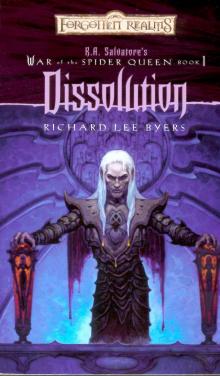 Dissolution
Dissolution Arkham Horror- Ire of the Void
Arkham Horror- Ire of the Void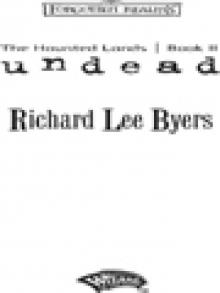 The Haunted Lands: Book II - Undead
The Haunted Lands: Book II - Undead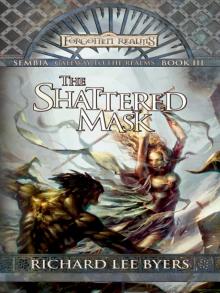 The Shattered Mask
The Shattered Mask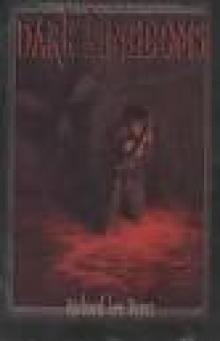 Dark Kingdoms
Dark Kingdoms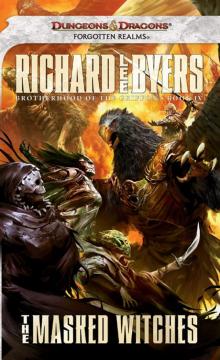 The Masked Witches: Brotherhood of the Griffon, Book IV
The Masked Witches: Brotherhood of the Griffon, Book IV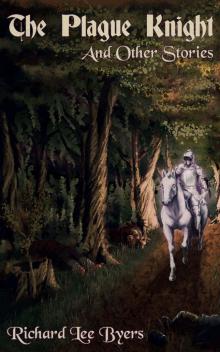 The Plague Knight and Other Stories
The Plague Knight and Other Stories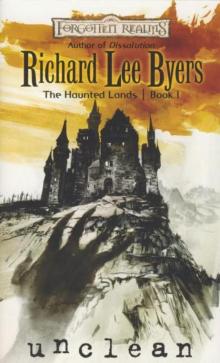 Unclean: The Haunted Lands
Unclean: The Haunted Lands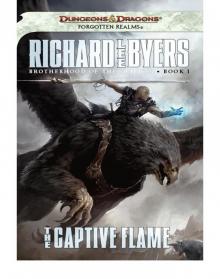 The Captive Flame: Brotherhood of the Griffon • Book 1
The Captive Flame: Brotherhood of the Griffon • Book 1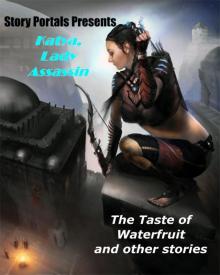 The Taste of Waterfruit and Other Stories (Story Portals)
The Taste of Waterfruit and Other Stories (Story Portals)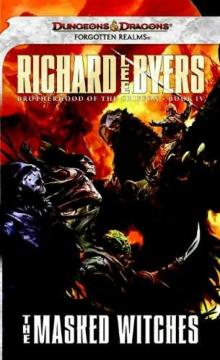 The masked witches botg-4
The masked witches botg-4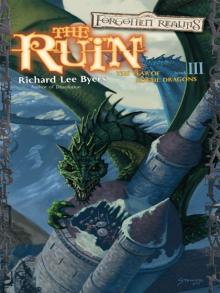 The Ruin
The Ruin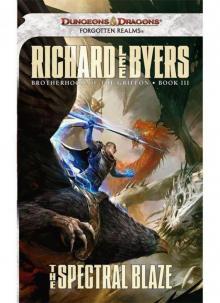 The Spectral Blaze botg-3
The Spectral Blaze botg-3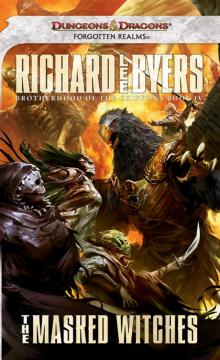 The Masked Witches
The Masked Witches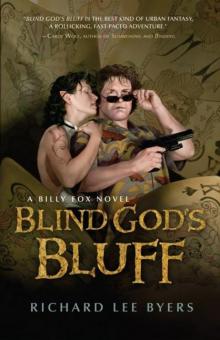 Blind God's bluff bf-1
Blind God's bluff bf-1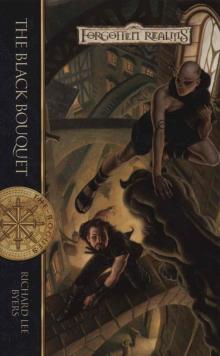 The Black Bouquet r-2
The Black Bouquet r-2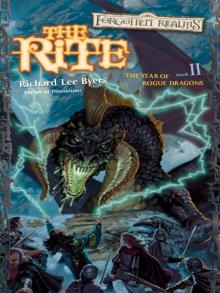 The Rite
The Rite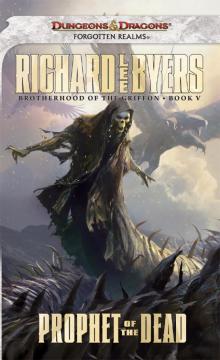 Prophet of the Dead: Forgotten Realms
Prophet of the Dead: Forgotten Realms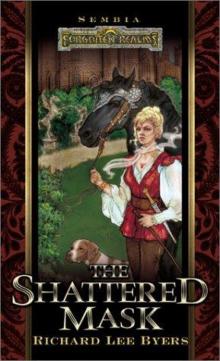 The Shattered Mask s-3
The Shattered Mask s-3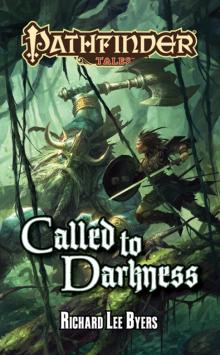 Called to Darkness
Called to Darkness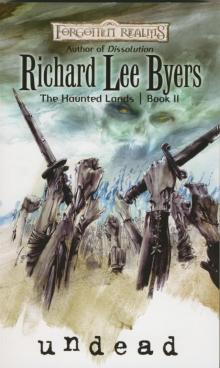 Undead hl-2
Undead hl-2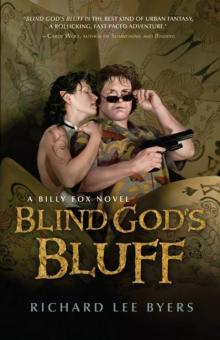 Blind God's Bluff: A Billy Fox Novel
Blind God's Bluff: A Billy Fox Novel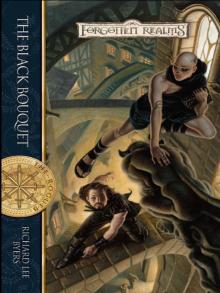 The Black Bouquet
The Black Bouquet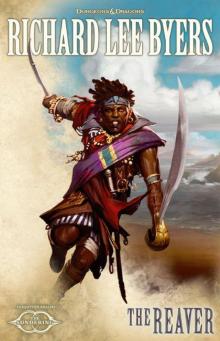 The Reaver
The Reaver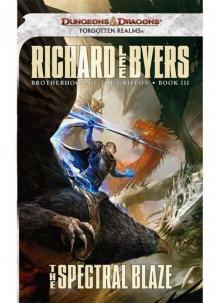 The Spectral Blaze: A Forgotten Realms Novel
The Spectral Blaze: A Forgotten Realms Novel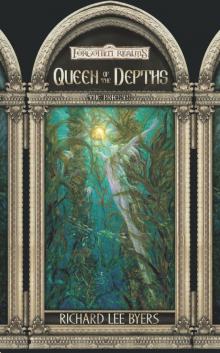 Queen of the Depths
Queen of the Depths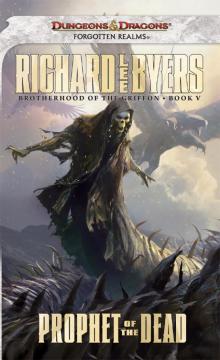 Prophet of the Dead botg-5
Prophet of the Dead botg-5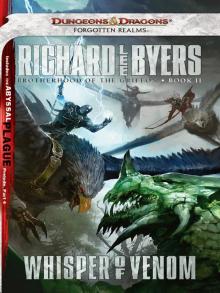 Whisper of Venom: Brotherhood of the Griffon, Book II
Whisper of Venom: Brotherhood of the Griffon, Book II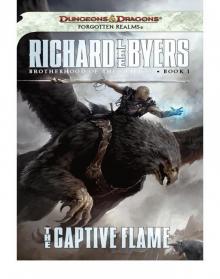 The Captive Flame botg-1
The Captive Flame botg-1 The Haunted Lands: Book III - Unholy
The Haunted Lands: Book III - Unholy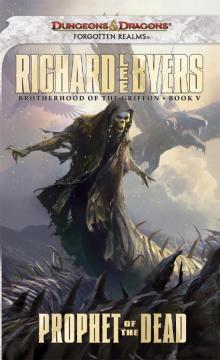 Prophet of the Dead
Prophet of the Dead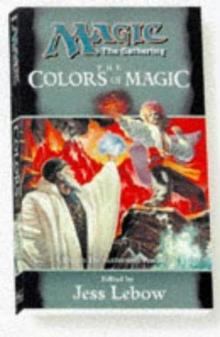 The Colors of Magic Anthology (magic: the gathering)
The Colors of Magic Anthology (magic: the gathering)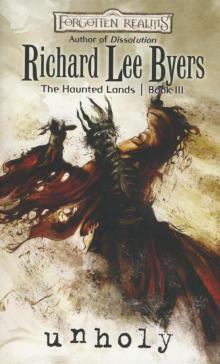 Unholy hl-3
Unholy hl-3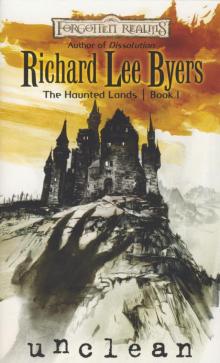 Unclean hl-1
Unclean hl-1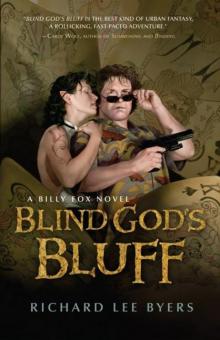 Blind God's Bluff
Blind God's Bluff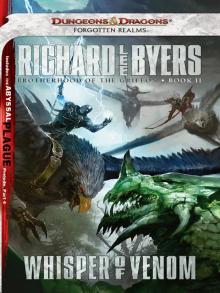 Whisper of Venom botg-2
Whisper of Venom botg-2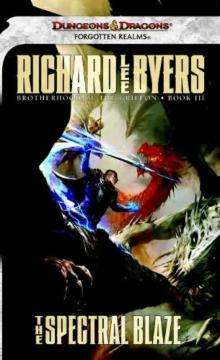 The Spectral Blaze
The Spectral Blaze